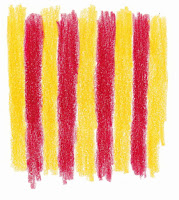We Catalans have always been a hairy people, so it's not surprising that we owe our flag (la senyera) to a 9th-century count of Barcelona named Wilfred the Hairy (Wilfred el Pilós). The story is lost in the mists of time, and historians love to poke holes in it, but we Catalans love to tell it.
It seems that Wilfred was helping the king of France, Charles the Bald--or perhaps his son, Louis the Stammerer--in a battle against the Visigoths (or perhaps the Moors). With Wilfred's help, Charles (or Louis) won the battle, but Wilfred was wounded.
The King wanted to show his gratitude, and Wilfred asked him to put a mark on his coat of arms, which was plain gold. With a sense of the grand gesture, Charles (or Louis), dipped four fingers in the blood of Wilfred and dragged them from top to bottom of the coat of arms. And that is how la senyera, also known as the four bars of blood (les quatre barres de sang) came about.
If you have watched Catalans marching and voting for independence in recent weeks, you may have noticed, in the ocean of waving senyeres, people holding up their hands with four fingers extended. They are duplicating the gesture, thirteen centuries old, of Charles the Bald (or maybe Louis the Stammerer) on the coat of arms of Wilfred el Pilós.
Most news reports attribute Catalans' desire for independence to financial matters. And it is true that Catalans pay the highest taxes in Europe and get precious little of that money back from the central government in Madrid. But it is much more than that. The secessionist impulse is based on a deep sense of separate identity, an identity whose clearest emblem is the Catalan language.
No one understood this better than Franco, and after winning the Spanish Civil War in 1939 he immediately forbade the use of Catalan in public fora. My generation was not taught to read and write Catalan in school; we did not see it in newspapers or street signs, or hear it in church or the radio or anywhere outside of home and the corner market. Franco imported the dreaded Guardia Civil from other parts of Spain to keep order in Catalonia. The guardias did not speak Catalan, and when addressed in the language would bark, "hablad cristiano!" (speak "Christian").
When Franco finally died in 1975 and Catalonia was granted a certain degree of autonomy, there was an explosion of feeling for all things Catalan, but especially the language. I have never known a population so obsessed with their native tongue. In a vegetable market in Barcelona in the early 1980s I overheard two old ladies, their net bags overflowing with the day's shopping, arguing about the proper Catalan term for "carrot," whether it was pastanaga, or safranòria.
So the Catalan desire for independence is not just about money, but also about history, tradition, language...and something else. It's an attachment to that fertile triangle tucked between the Pyrenees and the Mediterranean and coveted in turn by Greece, Rome, the Arab caliphate, and France, not to mention Spain. It's about the human towers wobbling against the sky, the geese in the cloister of the Barcelona cathedral, the sardana (as different from flamenco as a dance could be) danced by young and old on the city square. And through it all flows the sound of the language, long forbidden and reviled and all the more loved for that.
I heard a young Catalan on the radio today. "Why are you for independence?" the interviewer asked. "It's not the money," he answered. "It's more than that. I don't know. It's just a...a...It's a feeling!" he concluded, triumphantly. Many listeners probably found him inarticulate, but I know just what he meant.
Buckeye
4 days ago


Obviously, you have been on my mind a lot, my Catalan friend. Thank you so very much for this post.
ReplyDeleteIndependence has been declared, but the president of Catalonia has asked for a "halt in implementation" to give time for negotiation. Let's keep our fingers crossed.
ReplyDelete